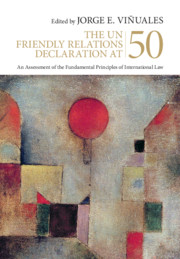 The UN Friendly Relations Declaration at 50
The UN Friendly Relations Declaration at 50 Book contents
- The UN Friendly Relations Declaration at 50
- The UN Friendly Relations Declaration at 50
- Copyright page
- Dedication
- Epigraph
- Contents
- Contributors
- Abbreviations
- Introduction
- 1 The System of the Friendly Relations Declaration
- 2 The Historical Origins and Setting of the Friendly Relations Declaration
- Part I The Principles of the Friendly Relations Declaration
- Part II Fundamental Principles of International Law beyond the Friendly Relations Declaration
- 10 Human Rights Protection as a Principle
- 11 The Fundamental Principles of International Humanitarian Law
- 12 Prevention of Environmental Harm
- 13 Freedoms in Common Areas
- 14 Principles Governing the Global Economy
- 15 The Friendly Relations Declaration at 50
- Appendix The Friendly Relations Declaration (also available at www.un-documents.net/a25r2625.htm)
- Index
12 - Prevention of Environmental Harm
from Part II - Fundamental Principles of International Law beyond the Friendly Relations Declaration
Published online by Cambridge University Press: 21 September 2020
- The UN Friendly Relations Declaration at 50
- The UN Friendly Relations Declaration at 50
- Copyright page
- Dedication
- Epigraph
- Contents
- Contributors
- Abbreviations
- Introduction
- 1 The System of the Friendly Relations Declaration
- 2 The Historical Origins and Setting of the Friendly Relations Declaration
- Part I The Principles of the Friendly Relations Declaration
- Part II Fundamental Principles of International Law beyond the Friendly Relations Declaration
- 10 Human Rights Protection as a Principle
- 11 The Fundamental Principles of International Humanitarian Law
- 12 Prevention of Environmental Harm
- 13 Freedoms in Common Areas
- 14 Principles Governing the Global Economy
- 15 The Friendly Relations Declaration at 50
- Appendix The Friendly Relations Declaration (also available at www.un-documents.net/a25r2625.htm)
- Index
Summary
The prevention principle, in its accepted formulation of Principle 21 of the Stockholm Declaration and, later, of Principle 2 of the Rio Declaration (hereafter ‘Principle 21/2’) is an extension of an older norm aimed at ensuring respect of the rights of other States which could be hampered as a result of activities conducted in the territory of a State. The activities which called for such an extension concerned inter alia the exploitation of natural resources. Before the emergence of an environmental consciousness in the 1960s, the ‘environment’ was perceived through the lenses of ‘natural resources’ and, to a far lesser extent, of ‘conservation’. What today is called ‘environmental’ harm was only a concern inasmuch as the exploitation of natural resources would have damaging consequences on a neighbouring State. The international legal response to such damage rested on the rules of State responsibility for internationally wrongful acts. The focus on reparation and compensation in case of environmental harm was an application of the traditional legal concepts protecting State sovereignty – these included in particular the sic utere tuo ut alienum non laedas rule (‘use your own property so as not to harm that of another’), the prohibition of abus de droit and the rules on good neighbourliness. These concepts translated the idea that, in an interdependent world, sovereignty can only be relative and is limited by the obligation to respect the sovereignty of other States. Such recognition crystallised in the ‘no harm’ rule, the obligation of States not to cause transboundary environmental harm.
- Type
- Chapter
- Information
- The UN Friendly Relations Declaration at 50An Assessment of the Fundamental Principles of International Law, pp. 283 - 313Publisher: Cambridge University PressPrint publication year: 2020
- 1
- Cited by


